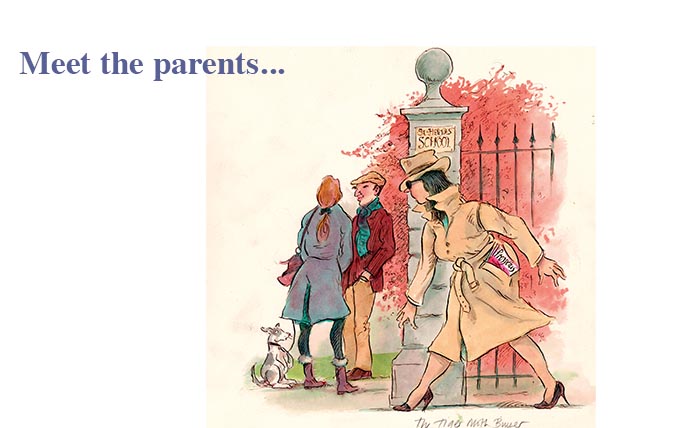Which parent-type are you?
Which parent type are you, when it comes to choosing schools?


Strictly speaking, choosing a school is simply a mammoth shopping expedition, although, sadly, without the January Sales. Aside from the family home, investing in education is probably the single most expensive purchase a parent will make, as well as arguably the most important one.
Putting aside for a moment the tried- and-tested method of choosing a school that meets the needs of individual children, years of supporting parents says to me it’s often as much about the parents’ buying type as it is about the child. Our personality, opinions and aspirations are merely the outcome of our life experiences and, unsur- prisingly, these have an influence on school buying decisions.
Bearing this in mind, perhaps parents embarking on one of the most important purchases of their lives should ask themselves ‘what type of buyer am I’?
The ‘I wasn’t happy at my school’ buyer
Decisions are driven by emotions from personal childhood experiences of school. May have felt they were bullied by peers, hated boarding, disliked single-sex environment or perhaps had a learning difficulty that wasn’t identified and supported. Finds it tricky to make decisions for their own children based on the here and now, independent of per- sonal experience.
The confused buyer
Constantly seeking opinions from dinner-party acquaintances, school- gate banter, family, friends and a whole range of experts. Believes every word they hear. As a result, tends to go round and round in circles
Sign up for the Country Life Newsletter
Exquisite houses, the beauty of Nature, and how to get the most from your life, straight to your inbox.

The third-generation buyer
A traditionalist, who will only consider the brand-name school great-grandfather attended. Tends to believe in the laidback approach in which putting the child’s name down from birth is still all that’s needed to secure entry. Lacks interest in the extensive ‘newcomers’ to the market. Probably wore a black armband when their school went co-ed or their former boarding house admitted girls. Strong supporter of alumni events and a proactive fundraiser.
with opinions about schools. Finds it impossible to make a final decision. Neglects personal gut feeling and tends to need others to approve of their choice.
The first-time buyer
Usually entrepreneurial, self-made, finance sector or dotcom parents investing their annual bonus in education, giving a leg-up to their children, which they didn’t have themselves. Expects a great deal from schools, including sometimes performing miracles, in return for their hard-earned investment. Likes to challenge and even mould a school rather than trusting the experts with hundreds of years of proven excellence behind them. Finds it tricky to handle the rottweiler receptionist who answers calls regarding admissions when enquiring about process, timing and procedure for applications. Lacks confidence to ask the right questions due to shortage of personal e‘xperience in this area
The professional middle-classs buyer
Both parents work their socks off to pay school fees, often in place of family holidays, cars and other luxuries, driven by a belief that independent education is a crucial investment in their children’s future. Often motivated by a worry that local State school options don’t offer the right environment to support their children’s individual needs. Scholarships, bursaries and, increasingly, help from grandparents are often critical to the finances adding up in the long term. Working hard, they often struggle to find time to research schools and process. Burning the midnight oil is a regular occurrence.

The tiger-mother buyer
Driven, passionate, ambitious, fully employed in steering their children’s achievements towards child-prodigy goals. Often worriers and deep thinkers. Whispers in hushed tones at the school gate and, in so doing, like an MI5 covert operation, seeks to find out the names of the best tutors to support their child’s rigorous home-learning programme. Once the help is in place, doesn’t like to share details with other parents in case their child loses the edge in a competitive entry process.
Pretest, interview and assessment dates are the most important ones on the family calendar and preparation is all-consuming. Forgets that schools are looking for the all-round child, who has the social skills and interests to contribute to the school community as a whole.
The international buyer
Has a passionate belief in the quality of all things British and sees schools in our green-and-pleasant land as the gold standard worldwide. Whether it be a Range Rover, grouse shooting, polo or independent schooling, the aim is to buy into all things British, often with the child’s pathway mapped since birth. From London pre-prep within walking distance of their Chelsea town house to Eton, Charterhouse or Sevenoaks, Oxbridge or LSE, their approach is driven by a passionate desire to give their child what they understand to be the best of British education. Brand names rather than an honest assessment of the child’s attributes and needs usually lead the search.
The ‘over my dead body’ buyer
Passionate opinions render certain pathways, such as private schooling or boarding, out of the question. Often lacking in up-to-date accurate knowledge. Struggles to keep an open mind, tending to consider schools that match political or personal opinions rather than which school provides the best solution for their child’s needs.

The ‘struggling to see through school marketing speak’ buyer
Trawls glossy brochures, websites and other marketing material drinking in information about dozens of schools over many months. Without an independent view or personal experience to go with their research, they find it tricky to identify the USP of each individual school and therefore which one might best suit their child. Nervous to take the plunge by short- listing and arranging visits to see the schools in action, so lacking a feel for the people and atmosphere that make each individual school unique.

The expatriate buyer
Currently optimising the opportunities of living abroad by immersion in other cultures within an international expatriate community. Children happily settled at international school abroad, parents drinking G&T and enjoying the sunny, country-club lifestyle, often blissfully unaware that things have moved on back home. Faced with a real dilemma as to when to transition from the local British international school back to the UK, to ensure the same successful entry to a top UK university as a home-grown student. Sudden contract changes or lack of information about the entry and assessment timeline and process for UK schools can lead to last-minute panic decisions and inevitable confusion or disappointment.

The keeping up with the Joneses buyer
Uses the local-net-curtain-twitching approach to school search. The ultimate networker, they have a full social calendar of coffee mornings, supper invitations and village- hall Pilates as well as being an acting committee member of charity or school fundraisers. They chalk up the miles with after-school clubs and activities and are fervent supporters of school concerts, plays and rugby matches. The only school choice is the local school, where parents’ social lives are a by-product of their child’s friendships. Exhausted commuter dads endeavour not to fall asleep at the dinner-party table.
Finally, whatever type of buyer you are, my advice is to put this aside, keeping your child’s personality, academic attributes and interests at the heart of your school search. You’ll be surprised how this opens up your options, making the whole process less complicated.
Country Life is unlike any other magazine: the only glossy weekly on the newsstand and the only magazine that has been guest-edited by HRH The King not once, but twice. It is a celebration of modern rural life and all its diverse joys and pleasures — that was first published in Queen Victoria's Diamond Jubilee year. Our eclectic mixture of witty and informative content — from the most up-to-date property news and commentary and a coveted glimpse inside some of the UK's best houses and gardens, to gardening, the arts and interior design, written by experts in their field — still cannot be found in print or online, anywhere else.
-
 Six rural properties with space, charm and endless views, as seen in Country Life
Six rural properties with space, charm and endless views, as seen in Country LifeWe take a look at some of the best houses to come to the market via Country Life in the past week.
By Toby Keel
-
 Exploring the countryside is essential for our wellbeing, but Right to Roam is going backwards
Exploring the countryside is essential for our wellbeing, but Right to Roam is going backwardsCampaigners in England often point to Scotland as an example of how brilliantly Right to Roam works, but it's not all it's cracked up to be, says Patrick Galbraith.
By Patrick Galbraith